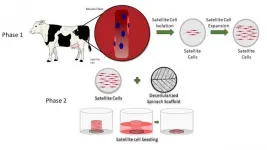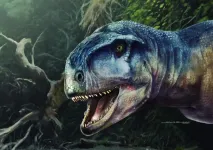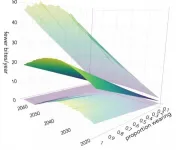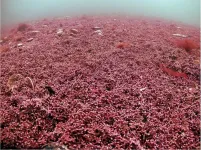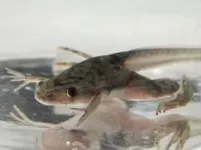(Press-News.org) COLUMBUS, Ohio - Bangladesh's floating gardens, built to grow food during flood seasons, could offer a sustainable solution for parts of the world prone to flooding because of climate change, a new study has found.
The study, published recently in the Journal of Agriculture, Food and Environment, suggests that floating gardens might not only help reduce food insecurity, but could also provide income for rural households in flood-prone parts of Bangladesh.
"We are focused here on adaptive change for people who are victims of climate change, but who did not cause climate change," said Craig Jenkins, a co-author of the study and academy professor emeritus of sociology at The Ohio State University. "There's no ambiguity about it: Bangladesh didn't cause the carbon problem, and yet it is already experiencing the effects of climate change."
Bangladesh's floating gardens began hundreds of years ago. The gardens are made from native plants that float in the rivers - traditionally, water hyacinths - and operate almost like rafts, rising and falling with the waters. Historically, they were used to continue growing food during rainy seasons when rivers filled with water.
The farmers - or their families - layer the plants about three feet deep, creating a version of raised-bed gardens that float in the water. Then, they plant vegetables inside those rafts. As the raft-plants decompose, they release nutrients, which help feed the vegetable plants. Those vegetable plants typically include okra, some gourds, spinach and eggplant. Sometimes, they also include spices like turmeric and ginger.
Floating gardens are also in use in parts of Myanmar, Cambodia and India. The United Nations Food and Agricultural Organization has named Bangladesh's floating gardens a Globally Important Agricultural Heritage System.
But as climate change has affected the volume of water in those rivers - creating extreme highs and floods, along with extreme lows and droughts - floating gardens have become a way for rural farmers to keep producing food during unpredictable weather. Climate change increases weather extremes and the severity of flooding, and droughts as well.
The researchers wanted to understand whether Bangladesh's floating gardens could be a sustainable farming practice as climate change continues to cause floods and droughts, and to see whether the gardens bring better food security to individual households.
"They've got to be able to grow specific crops that can survive with minimal soil," said Jenkins, who is also a research scientist and former director of the Ohio State Mershon Center for International Security Studies. "And in Bangladesh, a lot of small farmers that had typically relied on rice crops are moving away from those because of the effects of climate change and better returns from alternative crops."
For this study, the researchers interviewed farming families who use floating gardens, and found strong evidence that floating gardens provide stability, both in the amount of food available to feed rural populations and in a farming family's income, despite the instability created by a changing climate.
They found that farmers typically use hybrid seeds, which must be repurchased each year, to grow a diverse range of vegetables in the floating gardens. The gardens are also susceptible to pests, so farmers end up spending some money on both pesticides and fertilizers. But even with those expenses, they found, benefits outweighed costs.
Generally, entire families work on the gardens, the researchers found: Women, children and the elderly prepare seedlings and collect aquatic plants to build gardens. Men cultivate the gardens and protect them from raiders. Some families also farm fish in the waters around their floating gardens.
One farmer told the research team that he earns up to four times as much money from the gardens as from traditional rice paddies.
Still, the system could use improvements, the researchers found. Farmers often take out high-interest loans to cover the investment costs of building the beds and stocking them with plants. Lower-interest loans from responsible government or non-governmental organizations could alleviate that burden, they found.
INFORMATION:
CONTACT:
Craig Jenkins,
jenkins.12@osu.edu
Written by Laura Arenschield,
arenschield.2@osu.edu
PULLMAN, Wash. -- Nature's strongest material now has some stiff competition. For the first time, researchers have hard evidence that human-made hexagonal diamonds are stiffer than the common cubic diamonds found in nature and often used in jewelry.
Named for their six-sided crystal structure, hexagonal diamonds have been found at some meteorite impact sites, and others have been made briefly in labs, but these were either too small or had too short of an existence to be measured.
Now scientists at Washington State University's Institute for Shock Physics created hexagonal diamonds large enough to measure ...
Chestnut Hill, Mass. (3/31/21) -- Spinach, a cost-efficient and environmentally friendly scaffold, provided an edible platform upon which a team of researchers led by a Boston College engineer has grown meat cells, an advance that may accelerate the development of cultured meat, according to a new report in the advance online edition of the journal Food BioScience.
Stripped of all but its veiny skeleton, the circulatory network of a spinach leaf successfully served as an edible substrate upon which the researchers grew bovine animal protein, said Boston College Professor of Engineering Glenn Gaudette, the lead author of the new study. The results may help increase the production of cellular agriculture ...
Research published today in the peer-reviewed Journal of Vertebrate Paleontology describes a newly discovered species of dinosaur - named the 'one who causes fear', or Llukalkan aliocranianus.
Around 80 million years ago as tyrannosaurs ruled the Northern Hemisphere, this lookalike was one of 10 currently known species of abelisaurids flourishing in the southern continents.
A fearsome killer, Llukalkan was "likely among the top predators" throughout Patagonia, now in Argentina, during the Late Cretaceous due to its formidable size (up to five meters long), extremely powerful ...
Early treatment with anti-VEGF injections slowed diabetic retinopathy in a clinical study from the DRCR Retina Network (DRCR.net). However, two years into the four-year study its effect on vision was similar to standard treatment, which usually begins at the onset of late disease. The intermediate findings published today in the JAMA Ophthalmology. The study was supported by the National Eye Institute (NEI), a part of the National Institutes of Health.
"While it is possible that preventive injections of anti-VEGF drugs may help protect vision in the longer-term, ...
A new mathematical model suggests that the easing of lockdown must be accompanied by wider and more effective use of control measures such as facemasks even with vaccination, in order to suppress COVID-19 more quickly and reduce the likelihood of another lockdown.
The model, developed by scientists at the Universities of Cambridge and Liverpool, is published today in the Journal of the Royal Society Interface. It uses mathematical equations to provide general insights about how COVID-19 will spread under different potential control scenarios.
Control measures involving facemasks, handwashing and short-scale (1-2 metre) social distancing can all limit the number of virus particles being spread between people. These are termed ...
With shark bites increasing in countries like Australia - scientists say the use of personal electronic deterrents is an effective way to prevent future deaths and injuries which could save the lives of up to 1063 Australians along the coastline over the next 50 years.
The research, published in scientific journal Royal Society Open Science, shows that while shark bites are rare events, strategies to reduce shark-bite risk are also valuable because they can severely affect victims and their support groups - with one third of victims experiencing post-traumatic stress ...
Heart attacks in young adults are twice as likely to be fatal in those with inflammatory conditions like psoriasis, lupus or rheumatoid arthritis. That's the finding of a study published today in the European Journal of Preventive Cardiology, a journal of the European Society of Cardiology (ESC).1
At least 2% of people in Europe and worldwide have systemic inflammatory diseases, which often affect multiple organ systems. Many of these systemic inflammatory diseases are driven by autoimmunity, meaning the body's immune system attacks itself. Psoriasis is the most common and causes red, itchy, scaly patches on the skin, and can also cause inflammation in the joints. Rheumatoid arthritis leads to inflammation in joints of the hands and feet and in other organ systems. In systemic ...
Red algae that grow in Cornwall's Fal Estuary are genetically unique, new research shows.
University of Exeter scientists studied the population genetics of Phymatolithon calcareum, a coralline red algal species that forms maerl beds in shallow coastal seas from Portugal to Norway.
Large maerl beds fulfil a similar role to tropical coral reefs, providing habitats and vital shelter for hundreds or even thousands of fish and invertebrates. These algae also play an important role in storing carbon.
The findings reveal genetic differences are "structured geographically", with slight variations between populations sampled from across this large geographic area.
However, maerl ...
Human disturbance in urban environments makes some squirrels fail, but others perform better in novel problem-solving.
Unlike natural environments, urban areas have artificial buildings, traffics, less greenery and, most prominently, more humans. Despite these seemingly 'harsh' or stressful characteristics, some wildlife like the Eurasian red squirrel have chosen to settle down in urban environments, and they thrive. Urban wildlife often show higher behavioral flexibility and increased ability to solve novel problems, and thus can exploit new resources. However, which characteristics of urban environments influence animals' performance, and their relative importance, have remained ...
Scientists have discovered a new genetic disease, which causes some children's brains to develop abnormally, resulting in delayed intellectual development and often early onset cataracts.
The majority of patients with the condition, which is so new it doesn't have a name yet, were also microcephalic, a birth defect where a baby's head is smaller than expected when compared to babies of the same sex and age.
Researchers from the universities of Portsmouth and Southampton found that changes in a gene called coat protein complex 1 (COPB1) caused this rare genetic disease.
Now the variant has been identified, it will help clinicians come up with targeted interventions to help patients and their families, also opening the door to screening and prenatal ...
